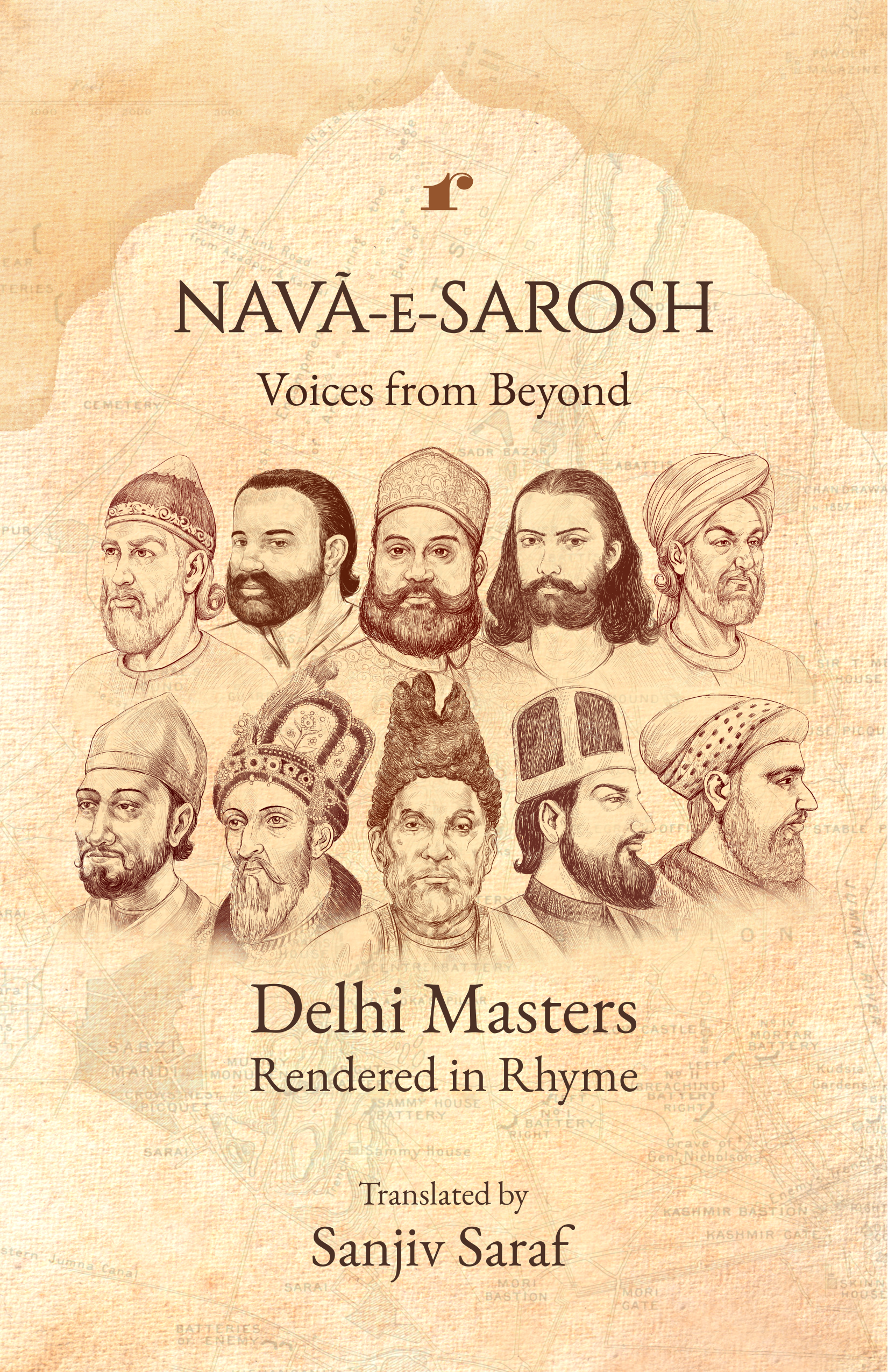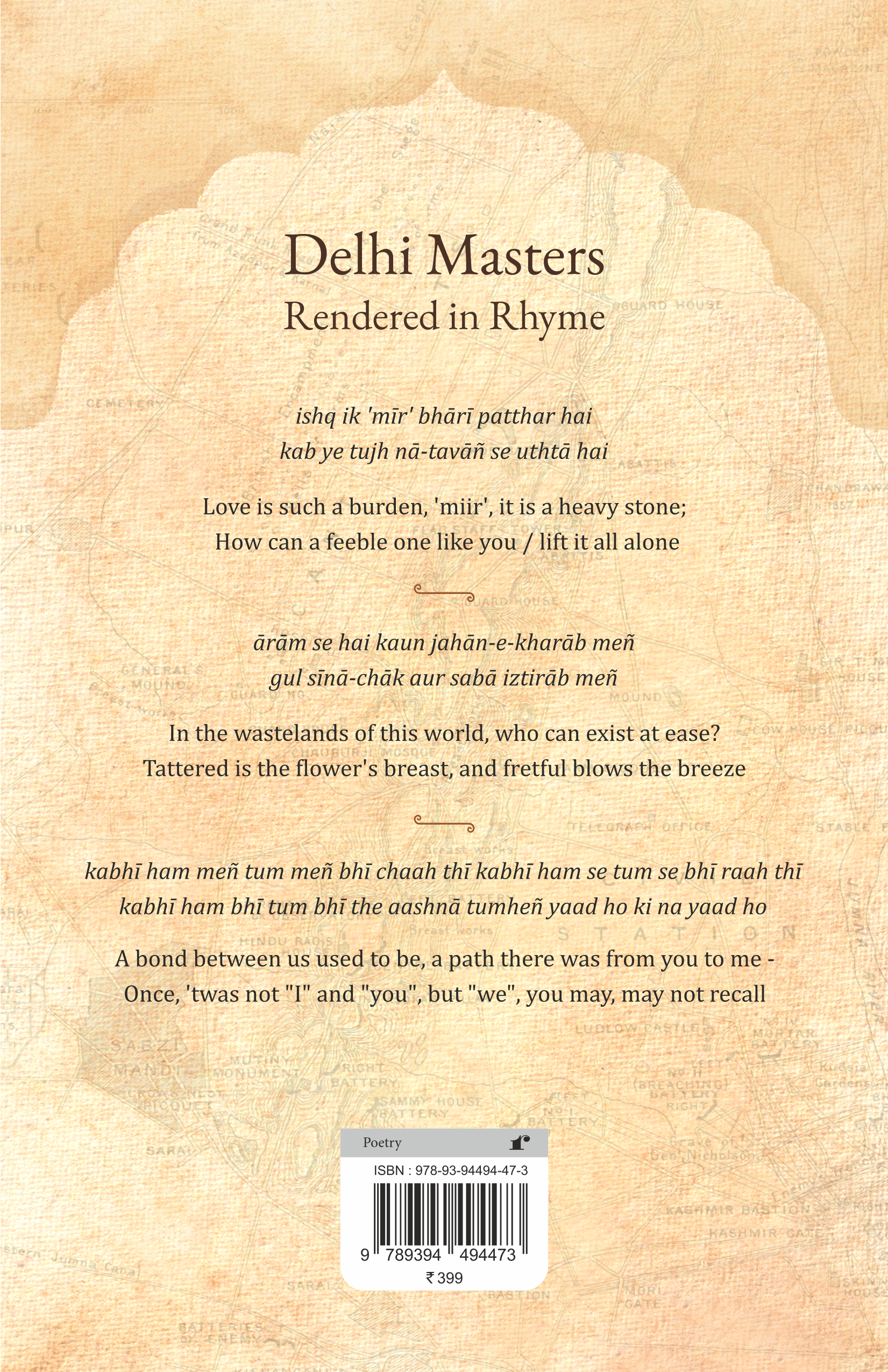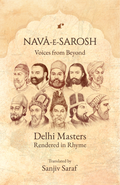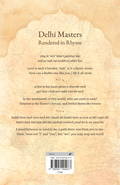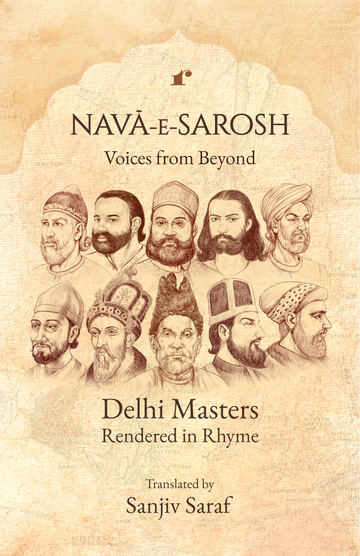Index
Sauda, Mirza Mohammad Rafi (1713-1781)
1 ādam kaa jism jab ki anāsir se mil banā
2 bulbul ne jise jaa ke gulistān meñ dekhā
3 gar tujh meñ hai vafā to jafākār kaun hai
4 gul pheñke hai auroñ kī taraf balki samar bhī
5 hindū haiñ but-parast musalmāñ ḳhudā-parast
6 ve sūrateñ ilāhī kis mulk bastiyāñ haiñ
Dard, Khwaja Mir (1721-1785)
7 arz-o-samā kahāñ tirī vus.at ko paa sake
8 bāġh-e-jahāñ ke gul haiñ yaa ḳhār haiñ to ....
9 ham tujh se kis havas kī falak justujū kareñ
10 jag meñ aa kar idhar udhar dekhā
11 madrasa yaa dair thā yaa ka.aba yaa ....
12 tohmat-e-chand apne zimme dhar chale
Mir, Mohammad Taqi (1723-1810)
13 chalte ho to chaman ko chaliye kahte ....
14 dekh to dil ki jaañ se uThtā hai
15 faqīrāna aa.e sadā kar chale
16 ġham rahā jab tak ki dam meñ dam rahā
17 hastī apnī habāb kī sī hai
18 jis sar ko ġhurūr aaj hai yaañ taaj-varī kaa
19 pattā pattā būTā būTā haal hamārā jāne hai
20 ulTī ho ga.īñ sab tadbīreñ kuchh na davā ....
21 yaaro mujhe muāf rakho maiñ nashe meñ ....
Mus.hafi, Ghulam Hamdani (1747-1824)
22 ḳhvāb thā yaa ḳhayāl thā kyā thā
23 dekh us ko ik aah ham ne kar lī
24 in aañkhoñ se aab kuchh na niklā
25 aa.e ho to ye hijāb kyā hai
26 avval to tire kūche meñ aanā nahīñ miltā
27 ġhusse ko jāne dīje na tyorī chaḌhā.iye
Zafar, Bahadur Shah II, Abul-Muzaffar (1775-1862)
28 baat karnī mujhe mushkil kabhī aisī to na thī
29 ishq mei.n kyā kyā mere junū.n kī, ....
30 lagtā nahīñ hai dil mirā ujḌe dayār meñ
31 nahīñ ishq meñ is kaa to ranj hameñ ....
32 shamshīr-e-barhana māñg ġhazab ....
Zauq, Sheikh Mohammad Ibrahim (1790-1854)
33 ab to ghabrā ke ye kahte haiñ ki mar jā.eñge
34 kyā aa.e tum jo aa.e ghaḌī do ghaḌī ke baa'd
35 laa.ī hayāt aa.e qazā le chalī chale
36 maze jo maut ke aashiq bayāñ kabhū karte
37 naala is shor se kyūñ merā duhā.ī detā
38 vo kaun hai jo mujh pe ta.assuf nahīñ kartā
Ġhālib, Mirza Asadullah Khan (1797-1869)
39 aah ko chāhiye ik 'umr asar hote tak
40 dā.im paḌā hu.ā tire dar par nahīñ hūñ main
41 dard minnat-kash-e-davā na hu.ā
42 zikr us parī-vash kaa aur phir bayāñ apnā
43 dil hī to hai na sañg-o-ḳhisht dard se ....
44 ye na thī hamārī qismat ki visāl-e-yaar hotā
45 kabhī nekī bhī us ke jī meñ gar aa jaa.e hai ....
46 ġhair leñ mahfil meñ bose jaam ke
47 tum jāno tum ko ġhair se jo rasm-o-raah ho
Momin, Momin Khan (1800-1852)
48 adam meñ rahte to shaad rahte use bhī ....
49 Dar to mujhe kis kaa hai ki maiñ kuchh ....
50 dil qābil-e-mohabbat-e-jānāñ nahīñ rahā
51 dil-bastagī sī hai kisī zulf-e-dotā ke saath
52 nāvak-andāz jidhar dīda-e-jānāñ hoñge
53 vo jo ham meñ tum meñ qarār thā tumheñ ....
Shefta, Mustafa Khan (1809-1869)
54 ārām se hai kaun jahān-e-KHarāb meñ
55 dast-e-adū se shab jo vo sāġhar liyā kiye
56 kam-fahm haiñ to kam haiñ pareshāniyoñ ....
57 mar ga.e haiñ jo hijr-e-yaar meñ ham
58 roz ḳhūñ hote haiñ do-chār tire kūche meñ
1
ādam kaa jism jab ki 'anāsir se mil banā
kuchh aag bach rahī thī so 'āshiq kaa dil banā
jab tesha kohkan ne liyā hāth tab ye 'ishq
bolā ki apnī chhātī pe dharne ko sil banā
jis tīrgī se roz hai 'ushshāq kaa siyāh
shāyad usī se chehra-e-ḳhūbāñ pe til banā
lab zindagī meñ kab mile us lab se ai kalāl
sāġhar hamārī ḳhāk ko math karke gil banā
apnā hunar dikhāveñge ham tujh ko shīshagar
TūTā hu.ā kisī kaa agar ham se dil banā
sun sun ke 'arz-e-haal mirā yaar ne kahā
‘saudā' na bāteñ baiTh ke yaañ muttasil banā
ādam1 kaa jism jab ki 'anāsir2 se mil banā
kuchh aag bach rahī thī so 'āshiq kaa dil banā
Adam-the first man 2. elements
Adam's body came to being / when elements combined
from the fire that remained / a lover's heart designed
jab tesha1 kohkan2 ne liyā hāth tab ye 'ishq
bolā ki apnī chhātī pe dharne ko sil3 banā
pickaxe 2. Farhad/ mountain breaker 3. pestle
when the mountain breaker picked / a pickaxe in his zest
love bid him a pestle make / to pound upon his breast
Note. 1a: Pg. 279
jis tīrgī1 se roz hai 'ushshāq2 kaa siyāh3
shāyad usī se chehra-e-ḳhūbāñ4 pe til banā
darkness 2. lovers 3. dark, black 4. faces of beauties
the inkiness which leads each day / of lovers to be dark
is the thing maybe that makes / beloved's beauty mark
lab zindagī meñ kab mile us lab se ai kalāl1
sāġhar2 hamārī ḳhāk3 ko math4 karke gil5 banā
wine-seller 2. goblet 3. dust 4. knead 5. clay
wine seller, in this lifetime how / can her lips meet mine?
knead my dust to clay that forms / her cup for drinking wine
apnā hunar1 dikhāveñge ham tujh ko shīshagar2
TūTā hu.ā kisī kaa agar ham se dil banā
talent 2. glass maker
glass-smith, I will show to you / my skill that day for sure
when somebody's broken heart / I'm able to restore
sun sun ke 'arz-e-haal1 mirā yaar ne kahā
‘saudā' na bāteñ baiTh ke yaañ muttasil2 banā
description of condition 2. adjoining
listening to my sorry state / my lover did decree
"'saudā', do not spin these tales / whilst sitting near me"
2
bulbul ne jise jaa ke gulistān meñ dekhā
ham ne use har ḳhār-e-bayābān meñ dekhā
raushan hai vo har ek sitāre meñ zuleḳhā
jis nuur ko tū ne sar-e-kan'ān meñ dekhā
barham kare jam'iyyat-e-kaunain jo pal meñ
laTkā vo tirī zulf-e-pareshān meñ dekhā
vā'iz tū sune bole hai jis roz kī bāteñ
us roz ko ham ne shab-e-hijrān meñ dekhā
ai zaḳhm-e-jigar sūda-e-almās se ḳhū kar
kitnā vo mazā thā jo namak-daan meñ dekhā
'saudā' jo tirā haal hai itnā to nahīñ vo
kyā jāniye tū ne use kis aan meñ dekhā
bulbul1 ne jise jaa ke gulistān2 meñ dekhā
ham ne use har ḳhār-e-bayābān3 meñ dekhā
nightingale 2.garden 3 thorn of desert
the songbird to the garden went, that one whom to see
in each thorn of wilderness, was visible to me
raushan hai vo har ek sitāre meñ zuleḳhā1
jis nuur2 ko tū ne sar-e-kan'ān3 meñ dekhā
name of wife of ruler of Egypt 2. radiance 3. in city of Kan.an
Zulekha, each star is by / that brightness glorified
the lustre, that in Canaan city, you once had espied
Note. 2: Pg. 279
barham1 kare jam'iyyat-e-kaunain2 jo pal meñ
laTkā3 vo tirī zulf-e-pareshān4 meñ dekhā
distressed 2. people of both worlds 3. magic/ fascination 4. dishevelled tresses
in moments, men and angels both / that which can distress
that enchantment I have seen / in your dishevelled tress
Note. 3: Pg. 279
vā'iz1 tū sune bole hai jis roz kī bāteñ
us roz ko ham ne shab-e-hijrān2 meñ dekhā
preacher 2. night of separation
the day of which O preacher, you daily hear and say
in the night of parting / I too have seen that day
Note. 4: Pg. 279
ai zaḳhm-e-jigar1 sūda-e-almās2 se ḳhū3 kar
kitnā vo mazā thā jo namak-daan4 meñ dekhā
wound of heart 2. dust of diamonds 3. habit 4. salt container
O heart's wound, with diamond's dust, yourself you should exalt
how great was the delight that lay / in a box of salt
Note. 5: Pg. 280
'saudā' jo tirā haal hai itnā to nahīñ vo
kyā jāniye tū ne use kis aan1 meñ dekhā
moment
'saudā' to your plight compared, she is not apropos
you saw her in what moment? I wonder who would know?
3
gar tujh meñ hai vafā to jafākār kaun hai
dildār tū hu.ā to dil-āzār kaun hai
nālāñ hūñ muddatoñ se tire saa.e ke tale
pūchhā na ye kabhū pas-e-dīvār kaun hai
har shab sharāb-ḳhvār har ik din siyāh hai
āshufta zulf o laTpaTī dastār kaun hai
har aan dekhtā hūñ maiñ apne sanam ko shaiḳh
tere ḳhudā kaa tālib-e-dīdār kaun hai
'saudā' ko jurm-e-'ishq se karte haiñ aaj qatl
pahchāntā hai tū ye gunahgār kaun hai
gar tujh meñ hai vafā to jafākār1 kaun hai
dildār2 tū hu.ā to dil-āzār3 kaun hai
oppressor 2. generous/benevolent 3. cruel
if you harbour loyalty / then who is treacherous
if you are benevolent / then who is barbarous
nālāñ1 hūñ muddatoñ2 se tire saa.e ke tale
pūchhā na ye kabhū3 pas-e-dīvār4 kaun hai
crying out 2. for ages 3. ever 4. behind the wall
for ages I'm lamenting here / underneath your shade
to ask "who is behind the wall?" / you never essayed
har shab sharāb-ḳhvār1 har ik din siyāh2 hai
āshufta3 zulf o laTpaTī dastār4 kaun hai
drinker 2. black 3. distressed 4. tangled head dress
every night's immersed in wine / and dark is every day
who is that with hair awry, headwrap in disarray?
har aan1 dekhtā hūñ maiñ apne sanam ko shaiḳh2
tere ḳhudā kaa tālib-e-dīdār3 kaun hai
moment 2. priest 3. seeker of the sight
preacher, every moment my / beloved I have seen
for a vision of your God, do tell me who is keen?
'saudā' ko jurm-e-'ishq1 se karte haiñ aaj qatl2
pahchāntā hai tū ye gunahgār3 kaun hai
crime of love 2. murder 3. sinner
for his crime of passion / 'saudā's' being slain today
do you recognise who is / this sinner, by the way?
4
gul pheñke hai auroñ kī taraf balki samar bhī
ai ḳhāna-bar-andāz-e-chaman kuchh to idhar bhī
kyā zid hai mire saath ḳhudā jāne vagarna
kāfī hai tasallī ko mirī ek nazar bhī
ai abr qasam hai tujhe rone kī hamāre
tujh chashm se Tapkā hai kabhū laḳht-e-jigar bhī
ai naala sad afsos javāñ marne pe tere
pāyā na tanik dekhne tiiñ rū-e-asar bhī
tanhā tire mātam meñ nahīñ shām-e-siyah-posh
rahtā hai sadā chaak garebān-e-sahar bhī
'saudā' tirī fariyād se aañkhoñ meñ kaTī raat
aa.ī hai sahar hone ko Tuk tū kahīñ mar bhī
gul1 pheñke hai auroñ kī taraf balki samar2 bhī
ai ḳhāna-bar-andāz-e-chaman3 kuchh to idhar bhī
flower 2. fruit 3. a spendthrift of garden
not just flowers, fruits as well, at others do you throw
O wastrel of the garden, some, this way too bestow
kyā zid hai mire saath ḳhudā jāne vagarna
kāfī hai tasallī1 ko mirī ek nazar bhī
solace
God would know, as why with me, she is so obstinate
or else, for my contentment, just a glance is adequate
ai abr1 qasam hai tujhe rone kī hamāre
tujh chashm se Tapkā hai kabhū laḳht-e-jigar2 bhī
cloud 2. piece of the heart
O nimbus cloud do swear upon / my tears and my sighs
have pieces of a broken heart / dripped ever from your eyes?
ai naala sad-afsos1 javāñ marne pe tere
pāyā na tanik2 dekhne tiiñ3 rū-e-asar4 bhī
hundred regrets 2. a bit 3. of or to 4. face of the result
O lament! your youthful death / a hundred times I grieve
the slightest hint, of consequence, I did not receive
tanhā tire mātam1 meñ nahīñ shām-e-siyah-posh2
rahtā hai sadā chāk3 garebān-e-sahar4 bhī
grief 2. dark evening 3. torn 4. dawn's collar
the Night's black garb is not alone / there in your lament
the ever-tattered collar of / the Dawn too is present
Note. 6: Pg. 280

